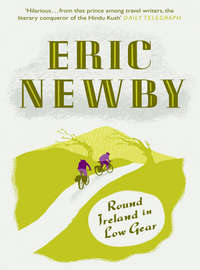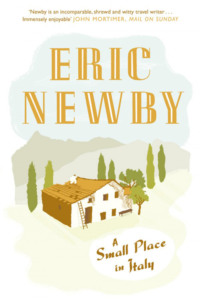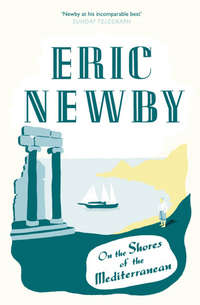
Полная версия
Love and War in the Apennines
After a few days we were dispersed, the officers to one camp, the men to another. We all survived the war and so did Socks, the dachshund. Pat, in accordance with Desmond’s last wishes, took her to Beirut where she took up residence with Princess Aly Khan. And George recovered sufficiently within a few days to make one of the most cold-bloodedly successful escape attempts from the camp to which we were sent when he, in company with a number of others, marched out through the main gate disguised as Italian soldiers. Unfortunately, they were all re-captured soon afterwards.
CHAPTER TWO Grand Illusion
A year later, on the seventh of September, 1943, the day before Italy went out of the war, I was taken to the prison hospital with a broken ankle, the result of an absurd accident in which I had fallen down an entire flight of the marble staircase which extended from the top of the building to the basement while wearing a pair of nailed boots which my parents had managed to send me by way of the Red Cross. The prison camp was on the outskirts of a large village in the Pianura Padana, the great plain through which the river Po flows on its way from the Cottian Alps to the sea. The nearest city was Parma on the Via Emilia, the Roman road which runs through the plain in an almost straight line from Milan to the Adriatic.
‘That’s right, knock the bloody place clown,’ someone said, unsympathetically, as it shuddered under the impact. The doctor who examined my ankle, who was also a prisoner, took much the same view. He couldn’t do much, anyway, because he hadn’t got any plaster of paris. It was, however, he said, ‘on order’ and for the time being he did it up with some adhesive plaster which was a rather wobbly arrangement.
The only other occupant of the hospital was another officer who was suffering from a boil on his behind. He was the one who had proposed that we should dig a tunnel, the most dreary and unimaginative way of getting out of any prison, on which a number of us had been working for some months, and which we had only recently abandoned because events seemed to have rendered it unnecessary. The head of the shaft of this tunnel was in a bedroom on the piano nobile of the building, practically in mid-air, and the shaft went down through the middle of one of the solid brick piers which supported it and down into the cellars. When we reached mother earth, somewhere below the floor of the cellar, if ever, he had planned to construct a chamber, in which the spoil could be put into sacks and hauled to the surface, and from it the tunnel would be driven outwards under the wire. The shaft had a false lid, designed and made by a South African mining engineer. It was a marvellous piece of work – a great block of cement with tiles set in it that was so thick that when the carabinieri tapped the floor of the bedroom with hammers, which they sometimes did, the lid gave off the same sound as the rest of it. This lid was so heavy that special tools had had to be devised to lift it.
There were a lot of attempts at escape, some successful, some of them funny. One prisoner hid himself in a basket of dirty linen, destined for the nuns’ laundry over the wall. We wondered what would have happened if they had actually unpacked him inside the convent. Some were very ingenious – two people had had themselves buried in the exercise field which was outside the main perimeter wire and was not guarded at night. They nearly got to Switzerland.1
No one from our camp ever reached Switzerland before the Italian Armistice in 1943. It was generally believed that two British prisoners of war had succeeded in getting there, but I have never met anyone who actually knew who they were or which camps they came from. It was very difficult to get out of a prison camp in Italy. Italian soldiers might be figures of fun to us, but some of them were extraordinarily observant and very suspicious and far better at guarding prisoners than the Germans were. It was also very difficult to travel in Italy if you did get out. The Italians are fascinated by minutiae of dress and the behaviour of their fellow men, perhaps to a greater degree than almost any other race in Europe, and the ingenious subterfuges and disguises which escaping prisoners of war habitually resorted to and which were often enough to take in the Germans: the documents, train tickets and ration cards, lovingly fabricated by the camp’s staff of expert forgers; the suits made from dyed blankets; the desert boots cut down to look like shoes and the carefully bleached army shirts were hardly ever sufficiently genuine-looking to fool even the most myopic Italian ticket collector and get the owner past the barrier, let alone survive the scrutiny of the occupants of a compartment on an Italian train. The kind of going over to which an escaping Anglo-Saxon was subjected by other travellers was usually enough to finish him off unless he was a professional actor or spoke fluent Italian. And in Italy, before the Armistice, there were no members of the Resistance or railway employees of the Left, as there were in France, to help escaping prisoners out of the country along an organised route.
The building in which we were housed had originally been built as an orfanotrofio, an orphanage, with the help of money contributed by pilgrims to the shrine of the miraculous Madonna del Rosario who, in 1628, had performed the first of a succession of miracles when, in answer to his prayers, she raised a man called Giovanni Pietro Ugalotti from his death bed.
The foundations had been laid back in 1928, but the work had proceeded so slowly that the war began before it could be completed, and it remained empty until the spring of 1943 when it became a prisoner of war camp for officers and a few other ranks who acted as orderlies.
It was a large, three-storeyed building with a sham classical façade, so unstable that if anyone jumped up and down on one of the upper floors, or even got out of bed heavily, it appeared to wobble like a jelly. To those of us who were lodged on one of these upper floors, it seemed so unstable that we were convinced that if any bombs fell in the immediate neighbourhood it would collapse.
Next door to the orfanotrofio was the santuario in which the miraculous Madonna del Rosario was enshrined, and on its walls there were large quantities of ex-votos contributed by those who had been cured of some bodily affliction or saved from disaster by divine intervention – crutches, pale wax replicas of various parts of the human body that had been restored to health, primitive paintings of ships sinking, houses and barns on fire, or being struck by lightning, motor cars and aeroplanes crashing and farm carts being overturned, from all of which, and many other more fantastic mishaps, the occupants were depicted as emerging or being ejected relatively unscathed.
Behind the santuario, and joined to it, there was a convent in which a body of nuns resided in complete seclusion from which they never emerged except in case of grave illness or when they were being conveyed to another house of their order. Otherwise, their nearest approach to contact with the outer world was when they participated in the masses celebrated in the santuario, at which times they could look out on the congregation in the body of the church unseen, hidden from view behind an iron grille.
All the laundry for the prisoners was done in the convent and from time to time we discovered little notes wrapped up in our clean sheets or tucked inside our shirts, which said that those who had washed them were praying for us and were calling down the blessings of the Madonna del Rosario on our unworthy heads.
Although we never saw them most of us liked having the nuns next door, and the santuario, too. The clanging of its bells broke the monotony of the long days, making the campanile sway with their violence and frightening the swallows, making them sweep in panic to the sky, until some prisoners who had migraine, or were atheists, or simply disliked bells or noise generally, used to put their heads out of the windows and scream, at the top of their voices, ‘I SAY, WOULD YOU MIND TERRIBLY TURNING IT IN?’ And if by chance the bells did stop at that particular moment, ‘THANK YOU SO MUCH!’ Or, if they knew a little Italian, ‘GRAZIE TANTO!’
In the centre of the village, which was called Fontanellato, out of sight of the prisoners in the camp, was the Rocca Sanvitale, a forbidding-looking fifteenth-century castle, isolated behind a water-filled moat. In the castle, until the war came, had lived the Conte Giovanni, the last of the Sanvitales, one of the most ancient and illustrious families in Italy, which, today, is extinct. The buildings which faced the castle had deep, shadowy arcades under which there were shops and cafés where farmers used to congregate on Saturday, which was market day; and in the street which led to the santuario and the orfanotrofio, there was a war memorial of the First World War, which for Italy had been much more bloody than the one she was at present engaged in, with a long list of dead on a plaque at the foot of it. This was more or less all we knew about Fontanellato. Apart from a senior officer who had been taken on a tour of the village for some reason, none of us had ever seen it. What I have written is the sum total of what he told us when he returned. It was rather like listening to a lecture by some medieval traveller and hearing him say, as he pointed to the map, ‘Here be dragons’.
Living in such a grandiose-looking building we felt that we could scarcely be regarded as objects of compassion by the local inhabitants. Although some officers when they arrived at it from other camps complained about the overcrowding, which was severe, and the lack of privacy, which was complete, to me and most of my friends who had been brought here from a much more primitive camp, it seemed a luxurious place and we were very surprised to find that we were to sleep in beds instead of the double-tiered bunks to which we were accustomed.
When we first arrived, at the beginning of March, there was no space for exercise outdoors, apart from a small, wired-in compound behind the building in which we assembled twice a day to be counted, or more frequently if the Italians suspected that someone had escaped; but the Italian commandant, an old, regular colonello, allowed parties of prisoners to go for route marches in the surrounding countryside once a week under a general parole, which covered the period when we were actually outside the gates. Parole or not, we were heavily guarded during these excursions which always followed routes along unfrequented lanes far from any village.
We looked forward to these outings which were sometimes cancelled at the eleventh hour for unexplained reasons, or because the senior officers refused to come to terms on some piddling point of military etiquette which most of the people in the camp, being temporary soldiers, and almost none of the Italians, because there were only about two regular soldiers among them, were ever able to comprehend. As in every other prison camp, the most lively differences of opinion between the senior British officer and the colonello and his staff arose over the interpretation of the various clauses of the Geneva Convention, which governed the treatment of prisoners.
We marched at a tremendous rate, glad of the exercise and taking sadistic pleasure in exhausting our guards who were mostly small men with short legs. We marched along flat, dusty roads; past wheat fields; fields in which forests of Indian corn were growing and into which I longed to take flight; along the foot of high green embankments which protected the land from the torrents which at certain seasons poured down from the Apennines into the River Po; past huge fields of tomato plants and sugar beet, groves of poplars, endless rows of vines and great rambling farmhouses with farmyards full of cows and pigs and ducks and geese, and red-roofed barns with open doors in which we could just see great, mouth-watering Parmesan cheeses ripening in the semi-darkness. Where we went we saw very few people. Perhaps they were told to keep out of the way when we went past.
Looking at this burgeoning countryside in the spring and summer of 1943 it was difficult for the most optimistic of us to believe that Italy was in danger of collapsing through lack of food, although it was obvious that the Italian army was very badly fed. One had only to look at the exiguous rations which the soldiers who guarded us drew from their cookhouse. And here, so far as I could make out, there were no organisations as there were in Britain to make their life more supportable. No volunteer ladies dishing out fish and chips to them, and great squelchy, jam sandwiches, and cups of orange-coloured tea, and, saying ‘Hello’ and asking where they came from, making them feel that they were doing something worthwhile which somebody cared about. They were like souls in limbo or a lot of untouchables in Hindu India, lost in the low-lying ground which no one ever visited, somewhere between the railway workshops and the cantonment.
By prison standards, the food in the orfanotrofio was good. The official rations were not abundant for non-manual workers, which is what we were, and without anything to augment them they had a lowering effect, especially in the previous camp where the British cooks had usually succeeded in making the worst of them – their version of pasta al sugo being particularly loathsome; to me it always smelt of dirty dish cloths.
But here, at Fontanellato, for the first time since I had been captured, there was a regular supply of Red Cross parcels and instead of the parcels being issued complete for us to make what we would of the contents, as had been done in other places, here all the cookable food was removed and prepared in the kitchens. This was much more civilised than keeping a lot of open tins under one’s bed, as some of us had previously done (the Italians never allowed us to have unopened tins in case we hoarded them for an escape) and risking death by eating the contents of a tin of disgusting meat loaf that had been open for two or three days or, even worse, spending ages on all fours blowing away at a stove made from old tin cans, stoked up with bits of cardboard or, in extremis, pieces of bed board from the bottom of our bunks, as many had done in the past.
Drink and supplementary food were bought on the black market, which was even more extensive and better organised than it was in Britain, and a special float of Red Cross cigarettes was kept for this purpose and for the general corruption of the Italian camp staff, by responsible members of the British administration, ex-bank managers mostly, to whom this sort of thing was second nature.
Officially, we were allowed one tot of vermouth and one of wine each day by our administration, which was all that could be allowed if, in theory, everyone took their ration; but you could always buy other people’s ration tickets with cigarettes or chocolate if you preferred drinking to smoking. Because of this there were some good parties and some rather awful ones too.
The very first lieutenant-colonel who was sent to us, previously we had scarcely anyone above the rank of captain, gave a memorable one.
‘Well, good night gentlemen,’ he said when most of the drink was finished. ‘Time for bed.’
He opened the door of a tall cupboard which stood against the wall and walked into it shutting the door behind him, presumably under the impression that he was entering his own room. By the time it had been forced open, which was difficult because his rather ample trousers had caught in it, he was fast asleep. He was a nice, high-spirited old man, much too old in years to have been captured fighting in the Western Desert.
The wines were strange, dark and repulsive with various chemical additives, what the Italians call vini lavorati, worked on, primitive harbingers of the more sophisticated, doctored wines which rarely contain any grapes at all and which have made the Italian wine industry the byword that it is today; but like meths drinkers we enjoyed them better than no alcohol at all.
There was even a bar in which these concoctions were served, high up in a sort of minstrels’ gallery above the chapel, which was used by the more staid prisoners to play bridge, and on Sundays for church services. We were forbidden by the Italians to look out of the windows of the bar which faced the road to the village, and if we did, the sentries in the watchtowers beyond the wire used to fire shots at us, some of which used to come whistling through the windows – the glass had been blown out long ago – and bury themselves in the walls and ceiling of the bar which had the same ecclesiastical decor as the chapel below. These bullet-holes gave the place a raffish appearance, like a middle-western saloon built by some renegade, gun-toting priest.
But in spite of these fusillades we still continued to risk our lives by putting our heads out of the windows, in order to be able to look at the girls of Fontanellato who, every evening when the weather was fine, used to promenade along the road in front of the orfanotrofio.
Some of my fellow prisoners had not spoken to a girl since they had been captured in 1940. Old or new prisoners, few of us had set eyes on girls like these for years and years. They were all shapes and sizes and colours and as they went past they laughed, as if enjoying some private joke, and tossed their heads impertinently in our directions. They all had long hair, short skirts and brown, bare legs and, as they swayed along the road, the high-heeled wooden sandals, which they all wore because there was very little shoe leather in Italy, clacked on the hard surface of the road. Some of them walked arm in arm with other girls carefully chosen for their inferior looks; some were so sure of themselves that they walked with girls who were their equals; others wobbled past in little flocks on bicycles, so slowly that they sometimes fell off uttering squeals of alarm – none was ever injured. There were scarcely ever any men with them. Presumably they were at the war.
The effect of these visions on the wretched Italian guards who were immured high up in their watchtowers, was as powerful as it was on us. Utterly distracted, they turned their backs on the orfanotrofio in order to look at them more closely, until some N.C.O., old enough and sour enough to be indifferent to women, screeched at them so loudly that they whirled round and, seeing us, discharged their rifles in the direction of the bar.
But not even the Italian Army in its most bellicose mood was able to stop us looking at the girls of Fontanellato, or the girls at us.
On one side of the orfanotrofio was the village cemetery in which the dead were stacked in recesses in the walls, one above the other, as if they had been put away carefully in some giant filing-cabinet marked ‘Pending’ until the last Trump sounded. Every Sunday, wet or fine, what must have been almost the entire girl population of Fontanellato as well as large numbers from the surrounding country, used to make the long pilgrimage up the via Cimitero to the gates, ostensibly to mourn their loved ones, and completely outnumbering the real mourners who could be easily distinguished by their black garb. If all these girls had been visiting the graves of their own kith and kin then the cemetery would have had to have been at least five times the size it was. Like participants in a slow-motion film they crawled past the front of the orfanotrofio, past the exercise field which had been opened a month after our arrival, and in which all exercise ceased from the moment the first of them came into view, and turned left up the road to the cemetery. Few of them bothered to enter it. Sometimes they waved if they thought the guards were not watching, or they might simply twirl a scarf, and from behind the barbed wire in the field and from every upper window of the orfanotrofio, from which the occupants could also see on fine days, and equally unattainable, the peaks of the pre-Alps beyond Lake Garda, more than 150 kilometres away to the north, the prisoners cheered and waved at them.
But in spite of these distant encounters with girls we were not unduly troubled by the lusts of the flesh – perhaps it was something to do with the diet. As one of my friends said, after drawing on himself one or two random shots while craning out of one of the windows of the bar, ‘It isn’t that one just wants to poke them. I’m not sure if I could do it any more, but it would be heaven just to be with them,’ which for him was a pretty profound remark.
It was fortunate that most of us felt as he did. Had we felt otherwise there was not much we could do about it except pull our puddings, and to perform the operation while lying cheek by jowl with twenty-six other people in a room which was illuminated by searchlights, required a degree of stealth which had deserted most of us since leaving school. Nevertheless, some of the more vigorous among us revived these ancient skills.
The lavatories – the gabinetti – were even more unsuitable than the dormitories for this purpose. They were of the kind in which you squatted over a dark hole in the floor and at unpredictable intervals a huge head of water like the Severn Bore came swirling up and filled your boots. It was hazardous enough using the gabinetti for the purpose for which they had been constructed without lingering in them, even to study the astonishing graffiti which can only have been produced by people who owned wellington boots. One officer made a fortune in cigarettes, which were the hard currency of the camp, salvaging valuable objects such as lighters, false teeth and wrist watches which their owners had dropped down the holes while occupying the gabinetti and which had gone round the bends in the pipes.
Even more difficult for the residents in the orfanotrofio was any kind of homosexual act. Whatever loves there were between prisoners could only be expressed by looks and words or perhaps a surreptitious pressure of the hand, otherwise they had to remain locked away within the hearts and minds of the lovers until they could be free or were moved to some more private place.2
Although they were outnumbered by officers drawn from the middle and lower classes who had had to be commissioned, just as they had been in the First War, because there were not enough members of the upper class to go round, it was the upper class which set the style in the orfanotrofio, just as they had done in the pre-war world outside; the sons and younger brothers of peers and Highland lairds, young merchant bankers, wine shippers and gentlemen jockeys who had ridden in the National, most of them concentrated in cavalry regiments, rifle regiments, one or two Highland regiments and the Brigade of Guards. These amateur soldiers, for they were mostly amateurs, and any professional soldiers who had the same sort of background (any others were soon made into figures of fun), made up the coteries of O.K. people who exercised power.
These people were very reluctant to consort with outsiders, but as the orfanotrofio was very overcrowded and it was almost impossible to summon up a coterie large enough to take over one of the bigger rooms which contained anything up to twenty-seven beds, and because these rooms were the most desirable because they were on the side of the building which faced away from the afternoon sun, and because not all coteries found other coteries agreeable to them for innumerable reasons which there is no space to go into here, the members always tried to ensure that the rest of the beds were occupied with what they regarded as more or less acceptable ballast, that is to say, or as they would have said if they had actually said it out loud, marginally O.K. people, the sort of people they were prepared to talk to and drink with while the war was on, and then would never see again. And this included a number of people whom they regarded as being downright common but who had the saving grace of being funny; and they took these comics on to the strength in much the same way as their ancestors had employed jesters and dwarfs, to while away the tedious hours between breakfast, lunch and dinner. Everyone else they ignored completely, unless they owned something worth buying, or had some skill which they could make use of to increase their comfort. It was not that they consigned these unfortunates to outer darkness; they simply never invited them in out of it.







